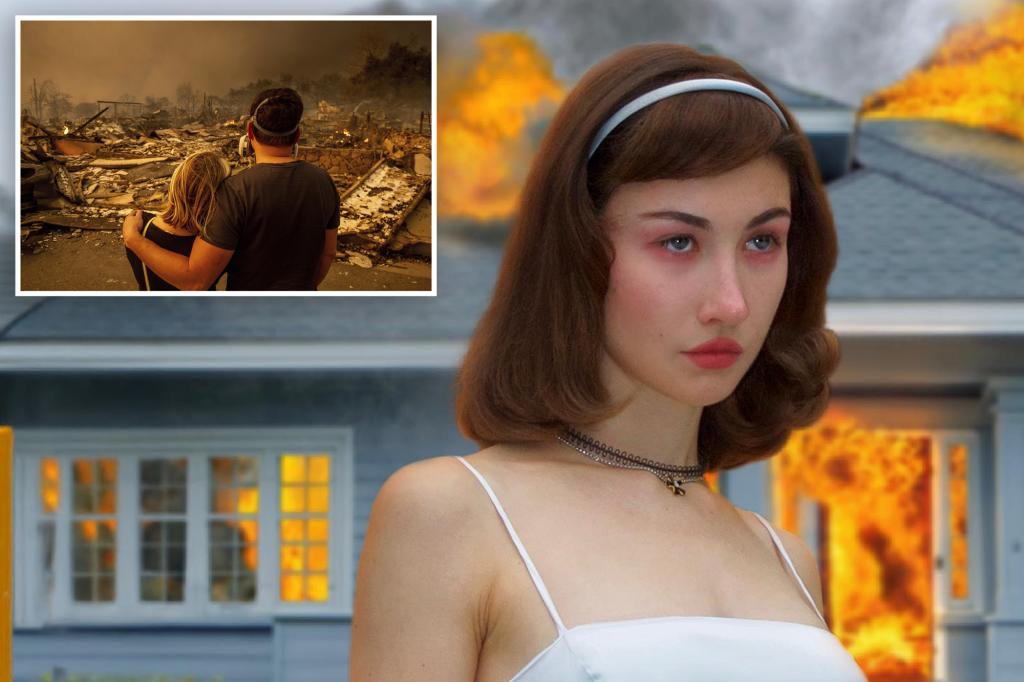The devastating wildfires sweeping through Los Angeles, claiming lives and displacing hundreds of thousands, became the backdrop for a social media controversy involving influencer Meg DeAngelis. DeAngelis, a 29-year-old Canadian content creator with a substantial online following, sparked widespread criticism with an Instagram story perceived as insensitive and tone-deaf. The story featured a selfie of DeAngelis pouting, accompanied by the caption, “When I escaped NYC because it was too cold, but now this one is literally burning down.” This seemingly flippant remark, juxtaposed against the backdrop of a catastrophic natural disaster, ignited a firestorm of backlash on platforms like Reddit. Users condemned her apparent disregard for the suffering of those affected by the fires, labeling her post as “privileged” and urging her to “read the room.” The criticism centered on the stark contrast between DeAngelis’s seemingly carefree attitude and the devastating reality faced by those losing homes, loved ones, and livelihoods. The public outcry highlighted the growing expectation for influencers to utilize their platforms responsibly, particularly during times of crisis.
The core of the criticism revolved around the perceived disconnect between DeAngelis’s trivialization of the wildfires and the profound impact of the disaster on communities. Commenters pointed out the insensitivity of her framing the situation as a mere inconvenience, complaining about excessive heat while others were grappling with the loss of everything. This perception of privilege was further fueled by the implication that DeAngelis could effortlessly relocate from New York to Los Angeles to escape cold weather, while many fire victims were facing displacement and uncertainty. The public’s reaction underscores the sensitivity surrounding disasters and the expectation that public figures, especially those with significant reach, will demonstrate empathy and awareness. The incident serves as a stark reminder of the power and responsibility that comes with influence in the digital age.
Adding fuel to the fire was the criticism that DeAngelis, instead of leveraging her substantial platform to raise awareness about the wildfires or provide support to affected communities, chose to center the narrative around her personal experience. This perceived self-absorption amplified the negative perception of her initial post. Critics argued that her decision to focus on her own discomfort, while others were facing life-altering circumstances, demonstrated a lack of awareness and social responsibility. The incident highlights a growing trend of holding influencers accountable for the content they share and the messages they convey, particularly during times of crisis. It underscores the expectation that those with large platforms should use their influence to contribute positively and avoid exacerbating sensitive situations.
In what appeared to be a response to the mounting criticism, DeAngelis subsequently posted a photo of the smoke-filled California sky, accompanied by a more somber message expressing concern for those affected by the fires. She stated, “In all seriousness, this is heartbreaking. I’m thinking about all the wildlife and everyone who is affected.” While this follow-up post attempted to address the concerns raised, it was met with skepticism by some who viewed it as damage control rather than a genuine expression of empathy. The incident highlights the challenges of navigating public perception in the digital age and the difficulty of recovering from a social media misstep. It also underscores the importance of authenticity and genuine concern in online communication, particularly for those with significant influence.
The DeAngelis incident was not an isolated case of perceived insensitivity amidst the wildfire crisis. A separate incident involving a group of young adults, speculated to be influencers due to their camera equipment, further ignited public outrage. The group was photographed posing for selfies in an evacuation zone near burning homes, seemingly oblivious to the gravity of the situation. This act was widely condemned on social media as “gross” and “stupid,” further fueling the discussion about the responsibility and ethical considerations surrounding social media behavior during disasters. The incident served as another stark example of the potential for social media to amplify insensitivity and highlight the disconnect between online personas and real-world consequences.
The backdrop of these controversies was the devastating reality of the wildfires themselves. Hundreds of thousands of residents were forced to evacuate their homes, and at least five lives were lost. The fires ravaged parts of iconic locations like Sunset Boulevard, leaving a trail of destruction in their wake. The sheer scale of the disaster underscored the gravity of the situation and amplified the criticism directed at those perceived as trivializing the suffering of those affected. The wildfires served as a stark reminder of the power of nature and the devastating impact such events can have on individuals and communities. The contrast between the devastating reality of the fires and the perceived insensitivity of some social media posts served to further highlight the importance of empathy and responsible online behavior during times of crisis.

